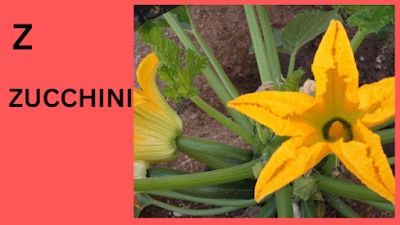5 Health Benefits of Zucchini

Nutrition and five health benefits of Zucchini.
Zucchini is a vegetable, though missing from the list of superfoods, and is versatile in its nutritional values and health benefits. As an alternative for the high carb-foods, it can help you prevent heart issues and stroke and improves your body's health.
 |
| Picture credit to Wikipedia |
Zucchini, also called Courgette, is a variety of the summer squash in the guard family, grown for its edible fruits. Though a fruit, by definition, is a vegetable. They are common in home gardens, readily available in supermarkets and the young ones are cooked into dishes and baked.
Plants are typically bushy, not vining, though some varieties creep; leaves are large and palmately lobbed. Both the stem and the leaves have plant hairs.
Zucchini, like all squash, has its ancestry in the Americas, specifically Mesoamerica.
The plant has three names, all meaning 'small marrow'; Courgette, a French loan word; Zucchini, an Italian loan word; and Baby marrow, in South Africa. The fruit ranges in colour from dark emerald green to yellow.
Zucchini is not included in the list of superfoods, simply based on a misconception that plants must have brightly coloured flesh to be rich in antioxidants.
Nutritional facts of Zucchini.
Zucchini contains several vitamins, minerals, and other beneficial plant compounds.
One cup (223 grams) of cooked Zucchini contains:
- Calories: 17.
- Protein: 1 gram.
- Fat, less than I gram.
- Carbs: 3 grams.
- Sugar: 1 gram.
- Fibre: 1 gram.
- Vitamin A: 40 % of the Reference Daily Intake (RDI)
- Manganese: 16% of the RDI.
- Vitamin C: 14% of the RDI
- Potassium: 13% of the RDI.
- Magnesium: 10% of the RDI.
- Vitamin K: 9% of the RDI.
- Folate: 8% of the RDI.
- Copper: 8% of the RDI.
- Phosphorous: 7% of the RDI.
- Vitamin: B6: 7% of the RDI.
- Thiamine: 5% of the RDI.
- Also contains tiny amounts of iron, calcium, zinc and several other B vitamins.
Health benefits of Zucchini.
1. High in antioxidants.
- If a person has an imbalance of free radicals, it can damage their body's fatty tissues, DNA, and proteins, causing oxidative stress that can cause a range of health issues.
- Zukkini, high in antioxidants, may help maintain a healthy level of free radicals to benefit health. This may also help to protect a person from the following health issues, such as cardiovascular disease, several types of cancers, eye-related disorders, skin disorders, etc.
2. Promote healthy digestion in several ways.
- Zucchini is rich in water content 94,8 %, which helps soften the stool and pass easily, reducing constipation.
- It contains soluble and insoluble fibre: the insoluble keeps the gut healthy and promotes digestion, adding bulk to stool and reducing the risk of constipation.
3. Reduce blood sugar levels.
Zucchini is low in carbohydrates, and if made a choice over high carbohydrate foods, it may help lower blood sugar levels. It helps reduce type 2 diabetes.
4. Improves eye health.
Zucchini is high in vitamin C, which is also an antioxidant. Some evidence suggests that vitamin C can reduce the risk of developing eye problems, such as age-related macular degeneration and cataracts.
5. Improves heart- health and circulation.
- Studies have shown that diets with high fibre can reduce the risk of coronary heart diseases and high levels of bad cholesterol. High lipid levels in the blood can increase a person's risk of the following health issues.
- Cardiovascular diseases.
- Several types of cancer.
- Eye-related disorders.
- Skin disorders.
- With its water-soluble pectin, Zucchini may lower the bad cholesterol and lipid levels in a person's blood, promoting heart health. Zucchini, high in potassium, can manage high blood pressure, a risk factor for heart attack, heart failure, peripheral artery disease, stroke and kidney failure.
Ways of keeping Zucchini.
Refrigerate:
To keep them fresh and last longer, keep them whole, and dry in an open paper bag in the refrigerator.
Freeze them:
Cut them into small pieces, blanch them in boiling water, and when cooled, freeze them. Once blanched, it remains in the freezer for a year without going bad.
Ways of using Zucchini.
Here are some ways to use this versatile vegetable.
- Thinly slice or grate raw Zucchini and add to salads.
- Chopped, sliced Zucchini is an excellent option to stirfry.
- Spiralise fresh Zucchini into pasta shape and use it as a low-carb alternative to pasta.
- Add into soups.
- Sliced and grilled Zucchini is a good side dish with olive oil and lemon juice.
- It is the main ingredient in the famous ratatouille. This involves combining Zucchini with other vegetables and a selection of herbs.
- Breadcrumb them and fry them in oil as a crispy side dish.
- Baked Zucchini work as a super side dish with many foods.
To avoid oil, baking and grilling can be done in air fryers.
Conclusion:
Zucchini is a vegetable, though missing from the list of superfoods, and is versatile in its nutritional values and health benefits. As an alternative for the high carb-foods, it can help you prevent heart issues and stroke and improves your body's health.
Is Zucchini a regular vegetable in your foods? Once, you include it, it can help you in many ways to improve your health.


Comments
Post a Comment